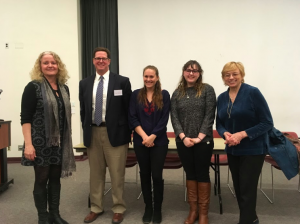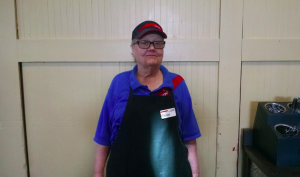
Apr 13, 2018 | Feature |

Kristen Sarasin, a member of the Performative Writing class, has a monologue and one-act in the Festival of New Works.
By Nicole Pilote Contributing Writer
Students in the Performative Writing for the Stage class have written and created plays that will be performed at the Festival of New Works near the end of April. The festival will feature ten minute monologues and one-act plays.
All of the plays are written and performed by UMF students. Each student has spent many hours writing and editing scripts of their plays, and they will direct their works on stage.
Kristen Sarasin, a Junior double majoring in English and Creative Writing and minoring in Women’s Studies, has a one-act play and a monologue that will both be performed during the festival.
“The Festival of New Works has allowed us to dig deeper into our scripts and constantly revise the piece as a whole,” Sarasin said. “The process is difficult but rewarding; it results in more polished work.”
Students Astra Pierson and Ian Grima, who auditioned in early March for the roles, will be performing the lead roles in Sarasin’s one act. Her play depicts the last moments of a marriage between a couple in the time of their divorce.
“I picked Astra and Ian as characters for this play because they both brought individual differences towards the role of each character,” Sarasin said. “Astra had strength and Ian had the softness that was easily relatable to the characters.”
The course, Performative Writing for the Stage, is a general education class that combines elements of playwriting and staging a show. It allows students to have a closer look into playwriting through writing scripts and developing characters, as well as learning the technical aspects of theatre such as lighting and sound. Jayne Decker, UMF’s theater professor, teaches the class. Students in the class met with Decker individually during workshops to perfect their work.
“I enjoyed writing the script for my one act because it allows room the explore the relationship between two people, to be able to show the honesty in people’s lives,” Sarasin said.
The Festival of New Works will be held on Thursday the 19th and Friday the 20th.
Apr 13, 2018 | News |
By Eryn Finnegan Editor-in-Chief
After months of anticipation and speculation, UMF professors, students and community members gathered in Emery Arts Center to learn which culturally significant works will be taught next school year as the next phase of the New Commons Project begins.
The project was initially met with 155 submissions from 12 counties across the state. From 155, the submissions were narrowed down to 25, and from there to the final 12. The final 12 submissions range from novels to television shows to albums and are meant to showcase cultural works that Farmington and the state of Maine in general finds important and that needs to be taught now.
The final 12 nominations are the American Canoe, Persuasion by Jane Austen, The Simpsons, poetry collection Dirt Road Home by Cheryl Savageau, jazz musician John Coltrane’s album Alabama, street artist Banksy, The Wire, Beethoven’s 6th Symphony, the FEDCO Seed Catalogue, rapper Kendrick Lamar’s album DAMN, James Baldwin’s essay The Fire Next Time, and the novel Inside Out and Back Again by Thanhha Lai.
Kristen Case, a UMF English professor and the head of the New Commons Project, commented that almost every selection had the aim of teaching the audience a lesson. From there, the submissions were narrowed down to two categories: those that teach us lessons such as raising awareness about a political or social issue, and those that teach us values such as love and especially empathy.
“You told us that these works should teach us how to empathize with one another,” Case said as she beamed at the audience. “You told us we should reflect on powerful social critiques, such as James Baldwin’s essay and Kendrick Lamar’s album, acknowledge works that were groundbreaking for their time, such as the canoe, or that they should be personally helpful.”
Astra Pierson, the student representative on the New Commons committee, also commented on some of the works, noting that many works held regional significance as well as personal beauty.
“You told us that we need these works because they teach us about the world, break traditional forms, exercise freedoms, and take risks,” Pierson said. “These nominations provide critiques, speak to this place [Maine] and landscape and people, and help us make it through the hard times.”
Christine Darrohn, another English professor, is optimistic about the works chosen and is thrilled about the broad range of mediums and people represented.
“I’m so excited to see so many different ethnicities and countries and orientations represented!” Darrohn said. “There are so many different pieces and the things you could teach about each of them are endless.”
Prior to the unveiling of the final 12, UMF hosted poet and essayist Lewis Hyde, who spoke “in defense of the cultural commons” and offered his insights into the project, noting that some of the works may run into copyright issues.
Starting in September, The New Commons Project will be taught amongst various entry level courses, as well as its own dedicated class: “Topics in Humanities: The New Commons,” listed as HUM-277H on the mycampus schedule planner under the category “humanities.” According to Case, the methods of teaching these works will range anywhere from writing essays to performing music in concerts based off of the material.
The New Commons Project is made possible by a grant from the Mellon Foundation and the Maine Humanities Council.
To learn more about The New Commons nominations, visit the website at http://newcommons.umf.maine.edu/.

Apr 13, 2018 | News |
By Darby Murnane Contributing Writer
A conference on modern-day human trafficking was recently co-hosted at UMF by The International and Global Studies Program, the Office of Global Education and the Pi Sigma Alpha Political Science Honors Society.
The conference included the screening of the documentary “I Am Jane Doe,” a speech by UMF student and human trafficking survivor Moninda Marube and panel discussion presented by other survivors and advocates.
Marube, a Community Health major, was the genius behind the conception of the conference. Seven years ago, he came to the U.S. from his home in Kenya to run races in hopes of raising money to bring home, where he lived in extreme poverty. However, all of the money he made was taken by a manager who also held Marube’s passport and documents so he could not walk away. Marube ev

The conference aimed to inform people of the dangers and sings of human trafficking. (Photo by Darby Murnane)
entually escaped to Maine, where he is still running and getting a college education.
The conference began with a showing of “I Am Jane Doe,” a film documenting the stories of families who sued Backpage.com, a website where their daughters had been sold into sex trafficking. Following the film was a short panel discussion involving UMF students representing the College Republicans and Democrats, as well as Attorney General Janet Mills and District Attorney Andrew Robinson. A major theme of the evening was imparting the knowledge that the face of human trafficking is not what one might see in movies. Robinson said, “It can happen to anybody’s kid from any kind of neighborhood. And it is happening in our neighborhoods.”
In an interview with Marube, he said “The days are long gone when people are forced to do things. The human exploitation that is going on in the world right now is not like the transatlantic slavery, whereby people were being abducted from their country and being put in chains. Those are very minimal cases. Nowadays it is about manipulation and blackmail.”
Marube defines the human trafficking network as a tree. “You can trim the branches,” he said, “but the roots keep growing.” One of the biggest challenges in combating trafficking is the ability to recognize victims and the ways in which their traffickers ensnare them. “Right now the signs are so hidden,” Marube said.
Janet Mills said after the panel following the documentary that she is pleased this conference is being held. “Public education is key. Parents and families need to know this happening,” Mills said.
Kristen Cloutier, a Secondary Education Social Studies major in the audience, was shocked to learn the scope of the realities of human trafficking.
“I knew what human trafficking was, but I never realized the immense reaches of it,” Cloutier said. “I had never even heard of Backpage before tonight. This has definitely been an eye-opener.”
In an email interview, Dr. Nicole Kellett of the International and Global Studies Program shared her goals for the conference as she too believes in the power of educating people.
“I hope that it raises awareness and incites action,” Kellett said. “You may be able to recognize a situation of trafficking and help. You may find yourself in a situation of being trafficked and know about resources to get out. You may be better informed on how to evaluate policies to be a more educated voter to support legislation that helps prevent trafficking.”
Marube shared an important message to impart when reflecting on it all; “I think each of you have a life, and each of you have a purpose in life. There are two most important days in your life: the day you were born and the day you know why.”

Apr 13, 2018 | Feature |
By Caitlin Raye Contributing Writer
In a vacant South Dining Hall, surrounded by the loud noise of the radio coming from the overhead speaker, sat a humble and beloved member of the Sodexo employee staff.
Eloise Wallace, a Sodexo employee, can almost always be found in the South Dining Hall twice a day, greeting students and swiping dining hall cards with a smile. Before working in the dining hall, Wallace taught at the childcare center on campus for 25 years, has been a student herself, and even worked on-campus while she was a high school student. Wallace has worked at UMF for a total of 34 years.

Eloise Wallace is a beloved member of both Sodexo and the UMF community.
Marshall Maxsimic, a junior, described Wallace in an email interview as someone who “is just always smiling and always interacting with students.” Maxsimic continued by saying, “Students know that if they are having a bad day, they will see Eloise later and she will ask them how things are going or wish them a happy Friday. There is no better feeling than entering the weekend with a ‘happy Friday’ from Eloise.”
When asked what qualities make her a good employee, Wallace was unable to say but expressed that, “I try to make sure I greet each [student] that comes through and that I do it with a smile. I try to make sure that everybody feels that they are an important part of this and want to come back again.”
Wallace continued by saying, “IIt doesn’t matter who anyone is or what their dress is, what their skin color is, what their orientation is. People are people!”
Eila McCulloch, a freshman, said in an email interview, “I have a very difficult name to pronounce. It is always mispronounced or butchered in some way, shape or form.” McCulloch said that “[Wallace] would stop me and make sure she was saying my name correctly whenever I came into the dining hall for lunch, until she was sure she had it right. It absolutely warmed my heart to know that someone would care that much about the students they see every day, especially when I am just one person of thousands on this campus.”
Maxsimic said, “[Wallace] always welcomes me with a smile to the dining hall. She also knows pretty much everyone’s name and uses their name when she greets them. I think that is pretty telling about her friendliness.”
In her years working at the dining hall, Wallace has won the “Dining Hall Staff Award,” voted by students each year. Wallace has received this award around 8 to 11 times. The award has recently been renamed the Eloise Wallace Dining Center Award.
Wallace expressed her gratitude by saying, “I’m very honored and I appreciate it. I think being recognized by you students is so much more than somebody walking out of the office and somebody said something like good job.”
While Wallace is thankful for the support and praise from the students, she explained that she no long wishes to be picked to receive the award because it is now named after her and feels she should not being given her own award. Wallace expressed that is it time for someone else to receive the recognition they deserve.
When talking about the award, Wallace felt that the whole dining hall staff deserved the award. “We are a team and it’s a team effort. And when somebody is out, we notice,” Wallace said. “This team, this group, nobody has a grudge for anyone. You just fill in. They do it for me so why not do it from them. I think that goes all the way around.”
Maxsimic and McCulloch both agree that Wallace is likable. Maxsimic said, “She is so likeable because she is very genuine in how she treats everyone. She is one hundred percent real and she honestly makes everyone feel good when they are interacting with her.” McCulloch echoed Maxsimic’s opinion by adding, “She is so likeable because she has such a warm personality and always radiates positivity.”
Outside of working, Wallace enjoys spending time at sporting events on campus, her favorite being basketball. Wallace enjoys the opportunity to go and watch, as well as speak with the players.
Outside of UMF, Wallace enjoys sewing and making quilts. She also likes to crochet and make afghan blankets. Along with sewing and crocheting, Wallace enjoys getting outside, going for walks and meeting up with friends. “I just enjoy living. I enjoy life and people,” Wallace said.

Apr 13, 2018 | Feature |
By Kristen Hill Contributing Writer
Travis Bent, a 2016 UMF graduate, spent nine months in Madrid, Spain as an English teaching assistant (ETA), which was fully funded through the Fulbright Scholar Program.
“One of the main objectives of a Fulbright Grantee is to be a “cultural Ambassador” Bent said. The Fulbright Program is an American scholarship program which encourages international education exchange. Graduates across the nation compete for this scholarship that gives them the opportunity to conduct research, study or teach abroad. The only basic requirement is a U.S. bachelor’s degree but Bent said, “One should keep in mind that you are competing with a nation of applicants, so it is highly competitive.”
Bent’s teachers pushed him to apply for this scholarship because they believed he had a great chance of getting it. The first decision he had to make was whether he wanted to do research or be a teaching assistant. He then had to choose which country he wanted to teach in. Bent graduated with a Bachelor’s in History as well as minors in Spanish, French and International and Global Studies.

2016 Graduate and Fullbright Scholar, Travid Bent.
“My main thought with this was, I am only going to apply to the place that I could dream of myself being in, a country that I loved and knew a lot about, which was Spain,” Bent said. He began taking Spanish is eighth grade and continued all the way through college.
Bent spent his time in Spain as an ETA at IES Ramiro de Maeztu, one of the biggest public schools in the country, where he taught three classes a day.
“The school I taught at was a bilingual school, so I was actually teaching subjects in English rather than Spanish,” Bent said. Bent taught classes on 20th century history and social media. He usually worked around 18 hours a week, and in addition, he taught private classes that he could charge significantly more for.
“The English level of the students was extremely high, which made my job easy,” Bent said. During his journey, Bent stayed with a Spaniard who showed him the way and helped him with his Spanish. Bent said, “We were in charge of finding our own living quarters from the start. The process of finding a piso [apartment] took me about two weeks, before then I was in a hostel.”
Before going to Spain, Bent had saved some money but “the money they gave us was more than enough to comfortably live and travel on,” he said.
The Fulbright Scholar application process includes a decision on conducting research, to study or to be an ETA and then where you want to be located. The application includes a general information form, three letters of recommendation, a one-page statement of grant purpose and a one-page personal statement.
“I probably spent about 100 hours on the statements and applications, blew through probably 15 drafts, as well as campus interviews where five professors interviewed me for about 30 minutes, about five minutes of which were in Spanish to test my ability,” Bent said about applying for the scholarship.
When Bent wasn’t working, he was exploring. “I enjoyed the different pace of life, the sights, the smells, and the lights. But I also used my long weekends to travel quite a bit,” Bent said.
In Spain, Bent traveled to Burgos, Barcelona, Salamanca, Toleda and El Escorial, as well as different parts of France, Portugal, England and Germany.




